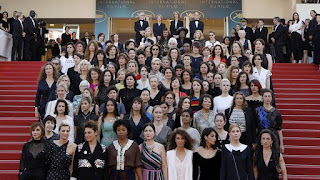End of gladiator sport for male gaze at Cannes
The "71:e Festival de Cannes" from May 8-19 has changed its agenda from its praxis of most recent years. It is being held a week earlier this year starting on a Tuesday and ending on a Saturday to be able to add an additional gala event ! before the first weekend, circulate previews of new films to be released in France and for maximum visibility of the Palme d’Or awards on Saturday night.
The other change this year is a ban on streaming production companies from premiering their online films at Cannes in the in-competition section. Streaming film is not considered a "proper" form for an original art work shown outside the realm of theatrical distribution at Cannes. There is also a new publication embargo on film reviews from the official selection until the premieres with the cast and crew. Previously film critics have seen the films a couple of times before the production team and reviews circulating beforehand interfere with the films getting a so-called fresh start. The plebeian kickstart with reviews by 4000 journalists has given way to the elite star studded gala opening on the red carpet with critics placed in a smaller venue close by at the same time However, it is more about French theater owners insisting on a film having theatrical distribution first and waiting three years before going online. This is not how things are done in the US that knows the market demands instant gratification.
According to Cannes festival director Thierry Frémaux these changes herald a new era of Cannes. They are intended to make the time-honored festival optimally exclusive where new films are unveiled without anyone having seen the official selection apart from the cast and crew. But it is quite clear that it is also about French theater owners guarding their market and not losing exclusivity to online conglomerates.
Netflix is not silent on the matter and has made its interest known in purchasing the opening night film by Asghar Faradi, the Spanish drama Everybody Knows which could go to immediate online distribution. Faradi casts mega Spanish couple Penelope Cruz and Javier Bardem on screen and off in a film about secrets from the past.
This publication embargo is predicated on the belief that revealing plot and narrative construction spoils a film. Yet, how a film is made is what gives a film its uniqueness. Most film critics do not write about the look and feel of a film, the stylistic content, so whereas you might learn beforehand what happens you don’t learn how it happens. Film critics who concentrate primarily on narrative content do not reveal the intricate design of the director. In this respect there are really no spoilers. A critic’s take on a film might conjure up an entirely different film than what is theatrically released.
This year the festival president is Cate Blanchett who has announced that films directed by women are still a paucity, making the festival a gladiator sport for the male gaze. Five women three actresses, one composer and one director constitute the majority of the official jury, but three male directors and one Chinese actor still prove that parity for directors is not there yet.
Several non-mainstream events cluster before the first weekend at small venues– The Swedish Institute and Women in Film & TV International (WIFTI) present Working For Change: 'Filmmaking In the New Landscape'. At the Irish Pavilion representatives from Eurimages and its "Gender Working Group", the BFI Film Fund, the New Zealand Film Commission and the South African Screen Federation will discuss The Fight of Inclusion by women working in film. Other parallel events include a panel on next moves for #MeToo and the Gender Equality movement in Cannes. Probably the most radical talk of them all will be held by Nina Menkes, filmmaker and teacher at California Institute of the Arts and USC who will talk about the embedded misrepresentation of women in film language. Her emphasis is on changing the way films are shot, edited, framed and cast as noted in the work of male directors – a system that depends on perpetuating empty stereotypes for women with zero agency, and the ability to influence the narrative outcome.
Three of the 18 films of the official selections directed by women Alice Rohrwacher (Happy as Lazzaro - a meeting about a young peasant and nobleman), Eva Husson (Girls of the Sun - about a female Kurdish military battalion), and Nadine Labaki (Capernaum about an impoverished boy who sues his parents for giving him life
© 2018 - Moira Sullivan - Air Date: 05/9/18
Movie Magazine International
Movie Magazine International

Comments
Post a Comment